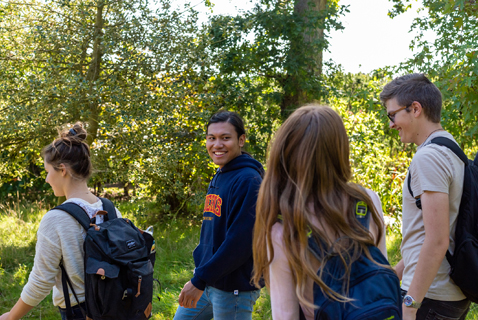Lead Instructor: Dr Robert Hyland - hylandr@queensu.ca
In Summary:
This is an introductory course, complementing and extending BADR100, focused on skills and approaches from a number of disciplines (Film and Media, Geography, History, and Sociology). Academic skills will be honed by centering on centrifugal forces of mobility, exchange and action. Processes such as warring, colonizing, trading, connecting and leading are highlighted.
![]()
![]()
Course Highlights: 
-
Applicable to a wide variety of academic plans, including History, Sociology, Drama, Languages, Literatures and Con-Ed.
-
Explore concepts of location, identity and boundaries that are at the heart of all academic inquiry across the Humanities and Social Sciences.
-
Develop academic and intercultural skills that will set you on the path to success in your degree and beyond.
-
A truly unique learning experience! BADR101 is structured to anticipate a changing employment landscape, that asks for inventiveness, flexibility and adaptability.
Course Information:
BADR100/101 are our flagship first year courses, and their primary aim is to give students all the critical skills and basic thinking frameworks that will allow them to move confidently through the rest of their studies. Working effectively with students of other academic disciplines is its core value, and its ‘Thinking Locally – Acting Globally’ framework reflects the castle’s position: a close-knit community, in idyllic Sussex, next to London, just across the channel from Continental Europe.
BADR101 continues from the ‘thinking locally’ framework of BADR100 (though BADR100 is not a prerequisite), and centres on ‘acting globally,' focusing on a selection of the most important processes through which localities interact: (1) WARRING, (2) COLONISING, (3) TRADING, and (4) CONNECTING.
At the end it asks students to reflect on how they can see themselves (5) LEADING within this wider global scale.
Learning Outcomes:
The learning outcomes are attained through: (1) lectures, seminars and guests in the classroom; (2) independent blended learning in each student’s own time and space; and (3) experiential learning off and on campus. By the end of the course students will know:
- the key principles and methods of a wide range of disciplines (History, Sociology, Geography, Gender Studies, Film and Media)
- how to conduct primary and secondary research, from exploring archives and databases to analysing and understanding their findings
- the interdisciplinary way of thinking and learning – something that will allow them to make informed and intelligent choices in the next steps of their studies.
- how to be citizens, travellers, and students in our contemporary globalised environment with confidence, intelligence and ambition.
Experiential and Active Learning Opportunities:
Examples of previous EAL opportunities for this course include: a visit to Mass Observation – Britain’s largest archive on modern popular opinion and everyday life. We looked at diaries of ‘ordinary’ British people, from the 1930s to today, on a range of topics, from food and music, to foreign affairs and race relations. And a midterm trip to Paris, where student visited different neighbourhoods of the French capital in small groups, exploring how global identities are constructed and how communities interact.
Prerequisites and Exclusions:
None.
Course applicable to the following Majors/Medials/Minors:
CODR (core) / DRAM (core) / HIST (core) / LLCU (option) / SOCY (core) / GNDS (option) / STSC (core) / BTEC (other core) / Con-Ed Teaching Subject (Dramatic Arts; History))

